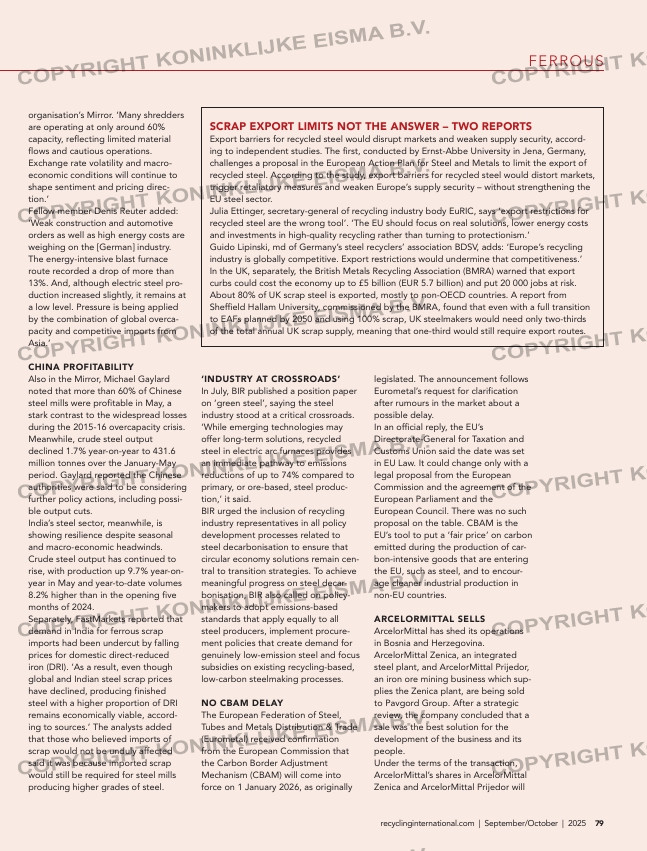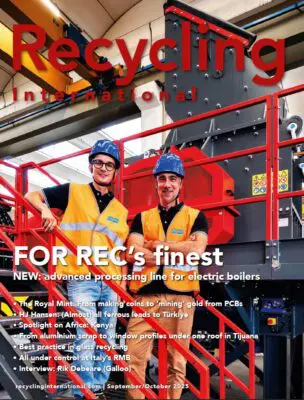Page 87 from: Recycling International September/October 2025

FERROUS
Scrap into Turkey
becalmed
79recyclinginternational.com | September/October | 2025
organisation’s Mirror. ‘Many shredders
are operating at only around 60%
capacity, reflecting limited material
flows and cautious operations.
Exchange rate volatility and macro-
economic conditions will continue to
shape sentiment and pricing direc-
tion.’
Fellow member Denis Reuter added:
‘Weak construction and automotive
orders as well as high energy costs are
weighing on the [German] industry.
The energy-intensive blast furnace
route recorded a drop of more than
13%. And, although electric steel pro-
duction increased slightly, it remains at
a low level. Pressure is being applied
by the combination of global overca-
pacity and competitive imports from
Asia.’
CHINA PROFITABILITY
Also in the Mirror, Michael Gaylard
noted that more than 60% of Chinese
steel mills were profitable in May, a
stark contrast to the widespread losses
during the 2015-16 overcapacity crisis.
Meanwhile, crude steel output
declined 1.7% year-on-year to 431.6
million tonnes over the January-May
period. Gaylard reported the Chinese
authorities were said to be considering
further policy actions, including possi-
ble output cuts.
India’s steel sector, meanwhile, is
showing resilience despite seasonal
and macro-economic headwinds.
Crude steel output has continued to
rise, with production up 9.7% year-on-
year in May and year-to-date volumes
8.2% higher than in the opening five
months of 2024.
Separately, FastMarkets reported that
demand in India for ferrous scrap
imports had been undercut by falling
prices for domestic direct-reduced
iron (DRI). ‘As a result, even though
global and Indian steel scrap prices
have declined, producing finished
steel with a higher proportion of DRI
remains economically viable, accord-
ing to sources.’ The analysts added
that those who believed imports of
scrap would not be unduly affected
said it was because imported scrap
would still be required for steel mills
producing higher grades of steel.
A U T H O R Robin Latchem P H O T O RI
cordat due to financial difficulties,
amid ongoing tight monetary policies
in the country to reduce high inflation.
Veysel Yayan, general secretary of the
Turkish Steel Producers’ Association,
told S&P Global Commodity Insights
in June that the Turkish steel industry
had faced mounting pressure from
indirect effects of the Iran-Israel con-
flict, as rising energy costs threatened
competitiveness.
RECOVERY HOPES
Market participants expected some
recovery in September as finished
steel demand picked up after the sum-
mer break. Sources were also looking
forward to a rate cut decision by
Türkiye’s monetary policy committee
(MPC) at its September meeting to
gauge near-term financial conditions.
At its July MPC meeting, the Central
Bank of Türkiye resumed interest rate
cuts, reducing the policy rate by 300
basis points to 43% while inflation is at
around 35%. US recyclers remain
reluctant to lower offers amid steady
dry freight rates and strong domestic
cues, while those in Europe stay opti-
mistic as scrap collection costs contin-
ue to remain within Eur 245-250 per
tonne delivered to dock levels, accord-
ing to sources.
UK AND GERMANY
Reporting to BIR members on the situ-
ation in the UK, Ferrous board mem-
ber Tom Bird said the recycled steel
market had remained largely subdued
in recent months. Key factors influenc-
ing this situation include a drop in
Turkish demand, a weaker US dollar,
and macro-economic uncertainty and
instability that depressed market senti-
ment. ‘Tight supply conditions persist,’
Bird wrote in the world recycling
SCRAP EXPORT LIMITS NOT THE ANSWER – TWO REPORTS
Export barriers for recycled steel would disrupt markets and weaken supply security, accord-
ing to independent studies. The first, conducted by Ernst-Abbe University in Jena, Germany,
challenges a proposal in the European Action Plan for Steel and Metals to limit the export of
recycled steel. According to the study, export barriers for recycled steel would distort markets,
trigger retaliatory measures and weaken Europe’s supply security – without strengthening the
EU steel sector.
Julia Ettinger, secretary-general of recycling industry body EuRIC, says ‘export restrictions for
recycled steel are the wrong tool’. ‘The EU should focus on real solutions, lower energy costs
and investments in high-quality recycling rather than turning to protectionism.’
Guido Lipinski, md of Germany’s steel recyclers’ association BDSV, adds: ‘Europe’s recycling
industry is globally competitive. Export restrictions would undermine that competitiveness.’
In the UK, separately, the British Metals Recycling Association (BMRA) warned that export
curbs could cost the economy up to £5 billion (EUR 5.7 billion) and put 20 000 jobs at risk.
About 80% of UK scrap steel is exported, mostly to non-OECD countries. A report from
Sheffield Hallam University, commissioned by the BMRA, found that even with a full transition
to EAFs planned by 2050 and using 100% scrap, UK steelmakers would need only two-thirds
of the total annual UK scrap supply, meaning that one-third would still require export routes.
‘INDUSTRY AT CROSSROADS’
In July, BIR published a position paper
on ‘green steel’, saying the steel
industry stood at a critical crossroads.
‘While emerging technologies may
offer long-term solutions, recycled
steel in electric arc furnaces provides
an immediate pathway to emissions
reductions of up to 74% compared to
primary, or ore-based, steel produc-
tion,’ it said.
BIR urged the inclusion of recycling
industry representatives in all policy
development processes related to
steel decarbonisation to ensure that
circular economy solutions remain cen-
tral to transition strategies. To achieve
meaningful progress on steel decar-
bonisation, BIR also called on policy-
makers to adopt emissions-based
standards that apply equally to all
steel producers, implement procure-
ment policies that create demand for
genuinely low-emission steel and focus
subsidies on existing recycling-based,
low-carbon steelmaking processes.
NO CBAM DELAY
The European Federation of Steel,
Tubes and Metals Distribution & Trade
(Eurometal) received confirmation
from the European Commission that
the Carbon Border Adjustment
Mechanism (CBAM) will come into
force on 1 January 2026, as originally
legislated. The announcement follows
Eurometal’s request for clarification
after rumours in the market about a
possible delay.
In an official reply, the EU’s
Directorate-General for Taxation and
Customs Union said the date was set
in EU Law. It could change only with a
legal proposal from the European
Commission and the agreement of the
European Parliament and the
European Council. There was no such
proposal on the table. CBAM is the
EU’s tool to put a ‘fair price’ on carbon
emitted during the production of car-
bon-intensive goods that are entering
the EU, such as steel, and to encour-
age cleaner industrial production in
non-EU countries.
ARCELORMITTAL SELLS
ArcelorMittal has shed its operations
in Bosnia and Herzegovina.
ArcelorMittal Zenica, an integrated
steel plant, and ArcelorMittal Prijedor,
an iron ore mining business which sup-
plies the Zenica plant, are being sold
to Pavgord Group. After a strategic
review, the company concluded that a
sale was the best solution for the
development of the business and its
people.
Under the terms of the transaction,
ArcelorMittal’s shares in ArcelorMittal
Zenica and ArcelorMittal Prijedor will
78-79-80_maferrous.indd 79 09-09-2025 13:59



